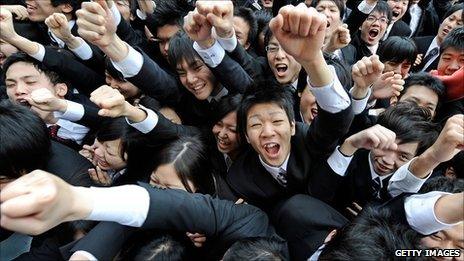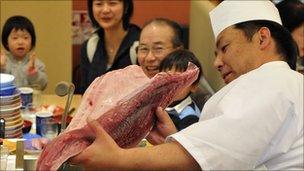Japan's young fight for work at home and abroad
- Published

Japan's students face a fight for their economic future - but does the answer to regaining the country's strength lie within or without its borders?
Japan's GDP figures are the final confirmation that the country has been overtaken by China as the world's second-biggest economy.
Japan has been through two lost decades, while China has been growing at a breakneck pace.
With its population shrinking, Japan needs to look overseas for growth to avoid being left further behind, but there is concern that instead, the young are becoming more inward looking.
It is recruitment season in Japan and for those soon to graduate, the pressure is on.
Dressed almost identically in black suits, they crowd into recruitment fairs where companies mount presentations about their businesses.
This is the starting point for the next generation of salarymen, who even these days stand a good chance of holding a decent job for life.
Insecure workers
But few companies will consider those who have already graduated.
So the students must succeed now, or risk being condemned to the growing ranks of temporary, insecure workers.
Seisuke Hayashi, who goes to the well-respected Waseda University, is starting early.
He isn't due to graduate until next year, but he spends his Friday evenings being coached for job interviews and pays for the privilege.
First lesson, how to enter the room. The approved method is march confidently, briefcase in right hand, coat folded over left arm, before stopping and bowing.
He would have liked to study abroad, but missing the recruitment round, the company seminars, fairs and interview sessions is just not worth the risk.
'Lack of initiative'
The number of Japanese going to foreign universities has fallen by a fifth since 2004.
"The Japanese are afraid of doing something different," says Seisuke Hayashi. "We are lacking in initiative. We like to follow in each other's footsteps, graduate after four years at university and get a job. That's the mainstream."

Japan's labour laws are rigid - especially when it comes to the raw fish skills needed to become a sushi chef
In Ginza, Tokyo's glitziest shopping street, the coaches carrying Chinese tourists are a reminder of the changing economic order.
They're big spenders now and many of the shops have signs in their windows confirming they welcome Chinese credit cards.
Business leaders here regularly complain that Japan's young have become more inward looking even as the economy has fallen behind.
And that's a problem, because Japan's own population is ageing and shrinking.
Some companies and individuals are waking up to the outside world and the prospects it offers.
The clothes chain Uniqlo has one of its flagship stores in Ginza.
Only Japanese
There's little prospect of growth in Japan, so it is already opening stores abroad.
The company has declared its ambition to be the biggest chain in the world by 2020, but there was a problem.
With little experience abroad, most of its employees spoke only Japanese.
So they have all been told they must learn English, by this time next year.
"We need to expand stores outside of Japan," says Daisuke Hase from Uniqlo. "To do that, we need to hire people in each local market.
"At the moment, 90% of employees are Japanese. In future, it may be 10% Japanese and 90% of people outside Japan. We need to communicate with those employees and to do that, we must have one common language and we chose English."
Elsewhere, there are more signs of change.
Rigid recruitment
At the Tokyo Sushi Academy, they are overturning centuries of tradition. Japan's recruitment practices are rigid, but nowhere more so than in the handling of raw fish.
To become a sushi chef usually requires a long apprenticeship, with years of mopping kitchen floors before being allowed to touch the ingredients.
But at the academy, they are teaching the basics in months.
And almost all the trainees want to open restaurants in foreign countries.
"I hope more Japanese will go abroad," says Hiroshi Shimamura as he combines raw salmon, green wasabi paste and rice into neat sushi pieces.
"When I was growing up 20 years ago, a lot of young people wanted to, but it seems that has changed. I hear people don't even want to take business trips now. It's hard for me to imagine."
Now Japan has been overtaken by China, many believe it is doomed to relative decline, to slip further down the global ranking.
Unless more of the young discover the drive to seek new opportunities for the economy abroad.